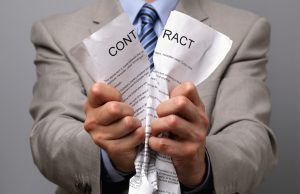 When clients come into our office with a breach of contract case, a large part of the conversation revolves around getting an idea of which damages and categories of damages are and are not recoverable in that specific case. This article is the first in a series dealing with the different types of damages a party can recover in a breach of contract case. As it’s the first, I think it makes sense to start with the most common type of damages: Actual Damages.
When clients come into our office with a breach of contract case, a large part of the conversation revolves around getting an idea of which damages and categories of damages are and are not recoverable in that specific case. This article is the first in a series dealing with the different types of damages a party can recover in a breach of contract case. As it’s the first, I think it makes sense to start with the most common type of damages: Actual Damages.
PlaintiffCo enters into a contract with DefendantCo whereby PlaintiffCo agrees to sell DefendantCo 100 bottles of wine for $100 per bottle of wine. If DefendantCo refuses to either accept delivery of the bottles of wine (that meet the specifications of the contract) or refuses to pay (according to the terms of the contract), what are PlaintiffCo’s damages? What could PlaintiffCo win in a lawsuit?
Actual Damages
This is the most common type of damages model and in most cases is arrived at by combining the plaintiff’s (in this instance PlaintiffCo’s) expectation interest and reliance interest in the contract. PlaintiffCo is always required, under this model, to take reasonable steps to mitigate or minimize the damage it will suffer once it learns of the breach of contract.
In some instances, PlaintiffCo’s actual damages will be limited to its expectation interest. For example, PlaintiffCo and DefendantCo enter into a valid, enforceable contract. Then, before PlaintiffCo can take any steps to supply DefendantCo with the bottles of wine, DefendantCo contacts PlaintiffCo to let it know that it no longer wants the bottles of wine and to tell PlaintiffCo that it is not going to accept delivery under the contract. In this case, were PlaintiffCo to go out and acquire the bottles of wine that meet the terms of the contract, it would be a failure of PlaintiffCo to mitigate its damages and PlaintiffCo would likely be limited to its expectation interest, which is the contract price for the wine ($100 per bottle) less PlaintiffCo’s cost to supply that wine ($80 per bottle). PlaintiffCo is entitled to recover $2,000. PlaintiffCo cannot increase its damages by taking steps to supply the wine under the contract, because doing so, after the contract has been renounced by DefendantCo, would be a failure by PlaintiffCo to mitigate its damages.
However, if PlaintiffCo does not find out about DefendantCo’s breach of contract until after PlaintiffCo has taken all the steps to procure and supply the wine, PlaintiffCo can also recover its reliance interests which would be those costs that PlaintiffCo took on to satisfy that specific contract. In this instance, PlaintiffCo buys the wine, crates the wine, and ships the wine to DefendantCo who then refuses delivery and refuses to make payment. In this instance, PlaintiffCo will be required to re-sell the wine to another party to mitigate its damages; however, the Plaintiff will still be able to recover its expectation damages ($20 per bottle of wine) as well as those costs specifically spent on fulfilling this contract (that can’t be passed along to a third party) which, in this instance, is the shipping.
There are other, more complicated damages models that can be used in breach of contract cases that will be touched on in later blog posts. However, actual damages are the most common form of damages asked for or received in breach of contract cases.
The attorneys at De Leon & Washburn, P.C. are available to assist clients with commercial litigation. For more information regarding the firm’s services, please visit our Practice Areas page, and please feel free to contact the attorneys at any time.
© De Leon & Washburn, P.C. This article is provided for informational purposes only. It is not intended as legal advice nor does it create an attorney/client relationship between De Leon & Washburn, P.C. and any readers or recipients. Readers should consult counsel of their own choosing to discuss how these matters relate to their individual circumstances. Articles are not continuously updated, so information may become out-of-date. Reproduction in whole or in part is prohibited without the express written consent of De Leon & Washburn, P.C.
